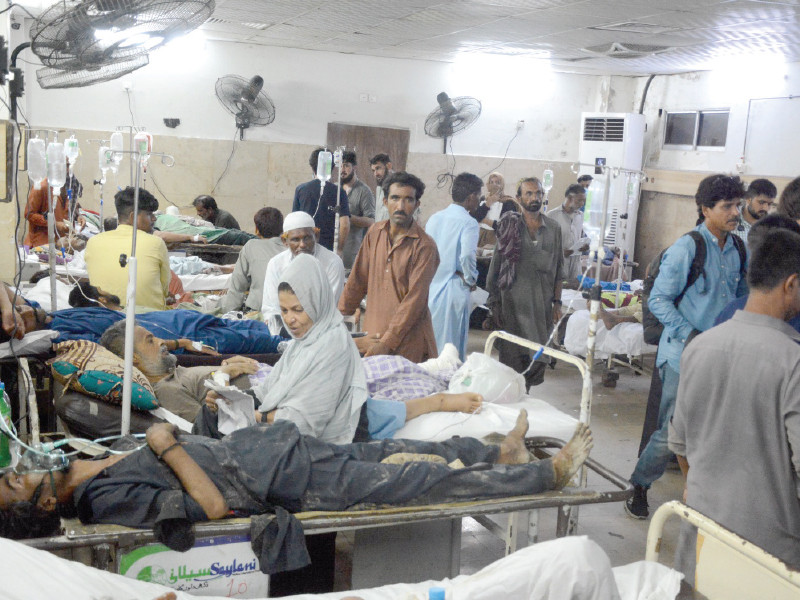
There has been a spike in the cases of gastroenteritis and diarrhea due to severe heat wave and humidity across Khyber-Pakhtunkhwa.
Official sources told The Express Tribune that most of the patients in the hospitals’ emergencies are found to be suffering from gastroenteritis and diarrhea.
In various hospitals across the province, 25,996 cases were reported in a week, many of them were also suffering from severe dysentery.
According to the health department, most of the gastroenteritis and diarrhea cases were reported from Dir Lower, Peshawar, Mardan, Abbottabad, Bannu, Lakki Marwat, and DI Khan. These areas are in the grip of heatwave, and prolonged load shedding added to the woes of the locals.
According to last week’s report from the provincial health department, the highest number of affected cases has emerged from Peshawar. In particular, 3,282 affected individuals were brought to hospitals and medical centers in Peshawar for treatment.
Official said that figures from major hospitals were not included as the emergency wards of those hospitals were breaming with such patients.
Due to the lack of space in some hospitals’ medical wards, patients are being accommodated in other wards where many have complained about the lack of attention from medical staff.
As many as 2,884 cases have been reported in Swat, 1,815 cases In Charsadda, 1,698 cases in DI Khan, 1,442 cases in Swabi, 1,282 cases in Lower Dir, 1,272 cases in Malakand, 1,202 cases in Bajaur, 1,186 cases in Nowshera and 1,060 cases in Mardan.
The report includes individuals suffering from gastro and diarrhea from all districts. It states that an increase in respiratory and chest diseases has also been observed, with emergence of 5,187 cases. Additionally, 4,396 cases of vector-borne diseases caused by flies and mosquitoes have been reported.
Last month, the health department issued a formal advisory to all hospitals, their administrations and district health officers to prevent the spread of diseases such as naegleria fowleri (brain-eating amoeba), cholera, diarrhea and measles, which can become epidemic in the summer season.
The guidelines issued to medical training institutes (MTIs), hospitals and DHQs state that naegleria fowleri has been deadly in Pakistan since 2008, with 150 cases reported so far.
It is essential to take preventive measures and enhance surveillance. The virus is commonly found in warm water lakes, waterfalls, rivers and soil. Infection can also be transmitted through contaminated water and nasal secretions, and can easily spread during swimming.
The incubation period of the disease is two to 15 days, and symptoms include headache, fever, stiff neck and neurological issue. Unfortunately, diagnosis is often delayed, and the disease carries a 97 per cent mortality rate.
The health department has urged the public to take precautions and seek immediate medical attention if symptoms persist.
The advisory also warned against putting water in the nose while swimming or diving, and stressed on the importance of cleaning water tanks, swimming pools, and drains.




1730752226-0/Untitled-design-(35)1730752226-0-165x106.webp)






1726140338-01730723472-0/Untitled-design-(42)1726140338-01730723472-0-270x192.webp)




1730706072-0/Copy-of-Untitled-(2)1730706072-0-270x192.webp)
COMMENTS
Comments are moderated and generally will be posted if they are on-topic and not abusive.
For more information, please see our Comments FAQ